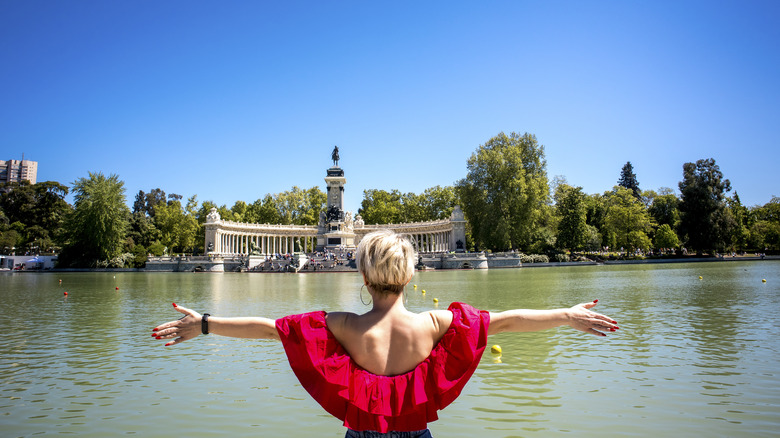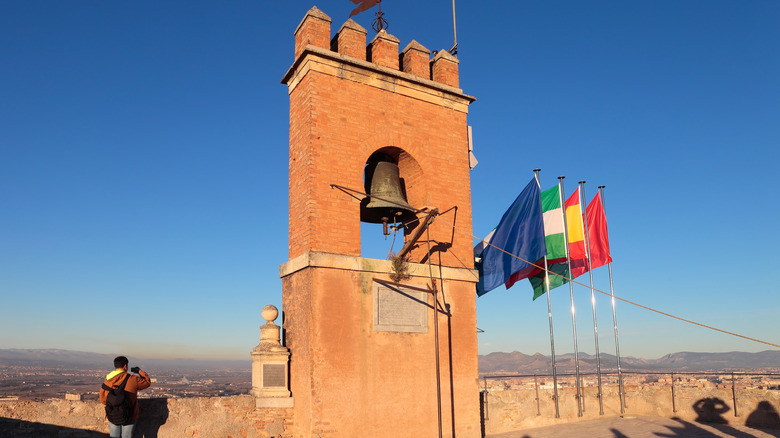The Most Important Phrases Tourists Should Know In Spanish Before Visiting Spain
Traveling to a country when you don't speak the language can be an exhilarating experience. It's fascinating to see how much we communicate without words, and which ones we really need to know to get around. Though you certainly don't have to be fluent in a country's language to visit, learning as much as you can is a gesture of respect for the trip you're on, people who live in the country, and just a generally nice thing to do. It can also help you to get what you ask for, where you're trying to go, and making things easier on the local person you're speaking with.
If the beautiful country of Spain is where you're headed, there are some important Spanish words and phrases for you to know before you go. There are, of course, the usual things to learn like greetings and "please" and "thank you." Then there are things you need to know if you have any special requests — like if you're a vegetarian traveling in Europe, for example — or how much something costs if it's not listed. We've got the most important words and phrases for you to learn as well as a few tips for other ways to make yourself understood.
Phrases that will be very useful in Spain
Here are some words and phrases to start with. "Yes" is "sí" (see) and "no" is simply, "no." To say "hello," you say "hola," (oh-lah). "Buenos días" (bwen-ohs dee-ahs) is "good morning," "buenas tardes" (bwen-ahs tar-dehs) is "good afternoon," and "buenos noches" (bwen-ohs no-ches) is "good evening." "Goodbye" is "adios" (ah-dee-ohs). "Thank you" is "gracias" (grah-thi-us). To ask how someone is doing, say, "Cómo está usted" (coh-moh es-tah oo-sted), which is the formal way of asking. If you're asked in response and you want to answer "well," say "bien" (bee-ehn) or "muy bien" (moy bee-ehn) for "very well."
You say "por favor" (poor fah-vor) for "please" and "perdon" (pehr-don) for "excuse me." "Lo siento" (low see-en-to) is "sorry." To ask where something is, you say, "dónde está" (don-deh es-tah) and then the thing you're looking for. If you want to ask how much something costs, say "cuánto cuesta eso" (kwan-to kwes-tah es-oh), and you can mime writing it down if you don't know Spanish number words.
Another really important thing to know is "puede ayudarme" (poo-eh-deh eye-you-darm-ay) which is how you ask someone to help you if you need it. If you would like something, say, "me gustaría" (mee goo-stah-ree-ah) which means, "I would like." If you can't eat fish, for example, you say, "no como pescado" (no coh-moh pes-kah-doh). "Habla inglés" (Ah-blah in-glays) means, "Do you speak English?"
Getting directions and more Spanish tips
To ask how to get somewhere, say, "Cómo llego a —?" (Komo yay-go ah ...) or, again, "dónde está." Knowing the words you may hear in response matters as well. "Ve a la izquierda" (vay ah liz-key-air-dah) means "go left." "Ve a la derecha" (vay ah lah der-ay-cha) means "go right." "Ve recto" (vay reck-toh) means "go straight on." If they're speaking quickly, say, "Puedes hablar más?" (Poo-eh-des ahb-lahr mahs) or "Can you speak slowly?" You can also tell people, "Hablo un poco de español" (Ah-blo uhn poh-coh deh es-pan-yol) which means, "I speak a little Spanish," and if it's really only these words, make a hand gesture to indicate something really tiny.
That's a big thing when traveling as well. We communicate with more than our voices. We use our faces, hands, and posture to indicate things. Think about someone who speaks only Spanish and a few words of English asking you for something. They can get a point across with gestures like hand to the mouth to indicate eating, or a wave for help. In a pinch, tourists traveling abroad can either try various language teaching tools and apps or especially the Google Translation app for a stress-free trip. With that, you can have live translation of a conversation as it's happening, use the camera to hover over signs and labels for instant translation, and simply look up what you want to say.


